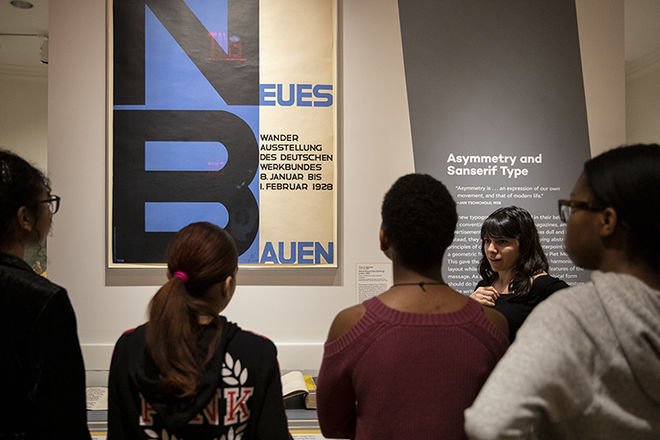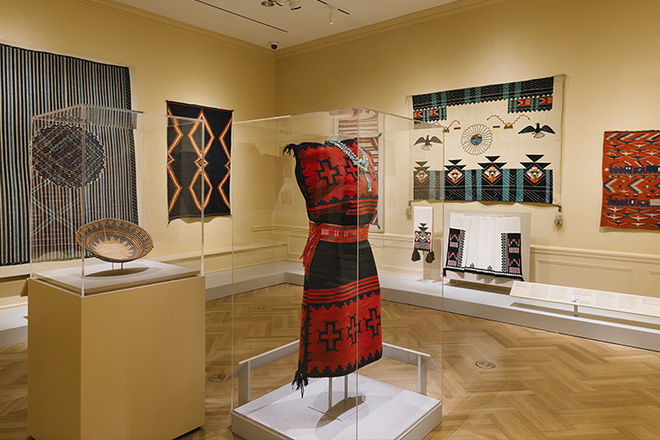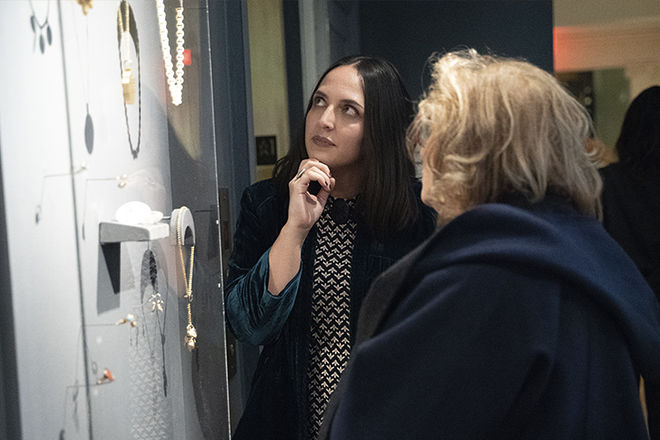Constructing arguments with material things is a mode of scholarship more readily associated with curators than with academics, who are rarely familiar with the challenges such work entails. Bard Graduate Center’s pioneering Focus Project aims to produce faculty and students who are bilingual in both museum and academic modes of scholarly investigation.

Each Focus Project is proposed and led by a Bard Graduate Center faculty member or postdoctoral fellow in collaboration with interested students. Originating in faculty research, the project is developed through seminars and workshops that proceed from broad issues of conception and definition through the specific challenges of selection, layout, and interpretation. Students are closely involved from genesis through execution and contribute substantively to each project’s form and content. These academic teams are assisted by a professional gallery staff of curators, designers, and media specialists, as well as the head of the Focus Project, a fellow faculty member with museum experience who acts as conceptual guide and facilitator.

Although Focus Projects culminate in a public exhibition in our Gallery at 18 West 86th Street, complete with accompanying publications and/or digital interactive features, the Focus Project is as much about process as product. By the time an exhibition opens, participants will have acquired hands-on experience of museum practice, from the development of a loan list to the composition and editing of wall labels.

Topics reflect the range of interests and perspectives of the Bard Graduate Center community, involving issues in the decorative arts, design history, and material culture studies. Past Focus exhibitions have investigated the material relations between Native peoples and newcomers on the Northwest Pacific coast in the late 19th century; the design and circulation of American Christmas cards; the fractal geometry of Benoît Mandelbrot; the role of actresses as fashion setters in the Belle Époque; the 1,500-year history of woven coca bags from the Andes; images of mid-19th-century New York City; the development of personal computer interface design; the role of indigenous knowledge in historical and contemporary Navajo textile dying and weaving; and the carving of meats and folding of napkins at European banquets in the early modern period. Through the Focus Project, Bard Graduate Center aims not only to mentor more versatile scholars, whether academics or curators, but also to encourage a new and collaborative form of curatorial scholarship.

Tour of Jan Tschichold and the New Typography: Graphic Design Between the World Wars, a Focus Exhibition curated by Paul Stirton, Professor Emeritus, Bard Graduate Center.
Each Focus Project is proposed and led by a Bard Graduate Center faculty member or postdoctoral fellow in collaboration with interested students. Originating in faculty research, the project is developed through seminars and workshops that proceed from broad issues of conception and definition through the specific challenges of selection, layout, and interpretation. Students are closely involved from genesis through execution and contribute substantively to each project’s form and content. These academic teams are assisted by a professional gallery staff of curators, designers, and media specialists, as well as the head of the Focus Project, a fellow faculty member with museum experience who acts as conceptual guide and facilitator.

Exhibition view of Shaped by the Loom: Weaving Worlds in the American Southwest, Focus Exhibition curated by Hadley Jensen, BGC/AMNH Postdoctoral Fellow in Museum Anthropology, and BGC Alum.
Although Focus Projects culminate in a public exhibition in our Gallery at 18 West 86th Street, complete with accompanying publications and/or digital interactive features, the Focus Project is as much about process as product. By the time an exhibition opens, participants will have acquired hands-on experience of museum practice, from the development of a loan list to the composition and editing of wall labels.

Sasha Nixon (MA ’18), curator of A View from the Jeweler’s Bench: Ancient Treasures, Contemporary Statements.
Topics reflect the range of interests and perspectives of the Bard Graduate Center community, involving issues in the decorative arts, design history, and material culture studies. Past Focus exhibitions have investigated the material relations between Native peoples and newcomers on the Northwest Pacific coast in the late 19th century; the design and circulation of American Christmas cards; the fractal geometry of Benoît Mandelbrot; the role of actresses as fashion setters in the Belle Époque; the 1,500-year history of woven coca bags from the Andes; images of mid-19th-century New York City; the development of personal computer interface design; the role of indigenous knowledge in historical and contemporary Navajo textile dying and weaving; and the carving of meats and folding of napkins at European banquets in the early modern period. Through the Focus Project, Bard Graduate Center aims not only to mentor more versatile scholars, whether academics or curators, but also to encourage a new and collaborative form of curatorial scholarship.



















